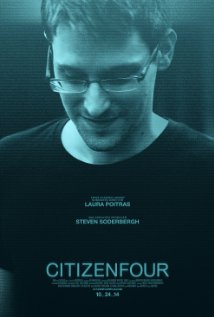
CITIZENFOUR
US, 2014, 114 minutes, Colour.
Edward Snowden, Glenn Greenwald.
Directed by Laura Poitras.
The Edward Snowden case was very much a story of 2013. He made headlines, was praised as well as vilified because of his whistleblowing, documentation he made available, the repercussions for national security, for invasions of privacy by surveillance, and the American government reaction.
Once he took refuge in Russia, he slipped from the headlines and, for world media consumption, he was not so important in 2014.
That was until this documentary about him and the events of 2013 was released, nominated for an Oscar and perhaps, very surprisingly, won the award. This raises the issues of how the case has been thought about in the United States, the hostility of the government and the criminal charges compared with public opinion and the fact that the members of the Academy would give it its award.
In fact, this is a very serious documentary. The maker behind the film, directing, producing, editing it is Laura Poitras who had made several documentaries about American politics in the aftermath of 9/11. She explains that she had been detained at passport control by American authorities after the release of some of her films. She was contacted by Snowden under the pseudonym sea, Citizenfour, and was invited to make contact with him in Hong Kong.
While the film does give some background to Snowden, aged 29, his work, the availability of secret material, his decision to make public documentation, his motivations, the bulk of the film is real-time footage, photographing Snowden in his Hong Kong hotel, cinema verite, it is certainly, offering quite an amount of material for audiences to respond to Snowden and listen to his explanations.
The other character to feature is Glenn Snowden, a journalist based in Brazil, writing articles on Snowden and going to Hong Kong, questioning, exploring, and publishing, with the UK paper, The Guardian, entering into the controversies with some American papers following.
While the public might not understand a lot of the material made available, the film raises issues of the public’s right to know, rights of privacy, government capacity for surveillance and the consequent use of data and metadata to track down the movements and activities of citizens.
Towards the end of this film, there is an appearance by Julian Assange, much better known to the public because of WikiLeaks? and the nature of government concerns, moves to extradite him, and his living in the Ecuador embassy in London. He offers advice about countries where Snowdon might take refuge.
In many ways this might be a transitional film, opening up the situation, introducing Snowden, but another film could deal with the consequences of his actions, the reactions of the American government and courts and governments around the world and the subsequent history of Snowden outside the United States.
1. Oscar for best documentary, 2014? Indication of attitudes in the United States towards Edward Snowden? Whistleblowers? Government surveillance and invasions of privacy?
2. Audience knowledge of Edward Snowden, his career, whistleblowing, revelations, fleeing the US, his time in Hong Kong, accusations against him, criminal charges, his escape from Hong Kong – and his taking refuge in Russia?
3. Audience views on Snowden, on whistleblowers, on the role of government surveillance and invasions of privacy?
4. The director, her career, suspect by the American government, her films about American political issues?
5. Snowden contacting her, the emails, the invitation, her agreement, going to Hong Kong with her crew, filming in real time? The communications
between Snowden and the director throughout the film?
6. Edward Snowden and his story, as a person as it emerges from the film? The facts of his decisions, his motivation?
7. Glenn Greenwald, journalist, his life in Brazil, his articles, the contact? Seeing him later in conferences in Brazil?
8. The Hong Kong sequences, the candid camera, the director and her crew unobtrusive, Snowden, Greenwald? The explanations? Hong Kong and the situation, the United Nations? The government?
9. The American response, hostile, accusations, charges?
10. The role of the press, the print media, The Guardian in the UK and Greenwald’s work, the other journalists? The meetings? The American papers?
11. The right of the public to know, the response of the public to the Snowden revelations? The political implications, governments and surveillance of phones, e.g. Angela Merkel? And Germany?
12. Issues of privacy, national security, law, rights of individuals? The use of material gained?
13. The UN interventions, the international group of lawyers, in Berlin?
14. Julian Assange, the precedents, the sequences with him, his comments about Snowden and the country for refuge?
15. How insightful a film about surveillance in the 21st century, the public and privacy? And privacy?
16. Edward Snowden’s life in abeyance, in Russia?